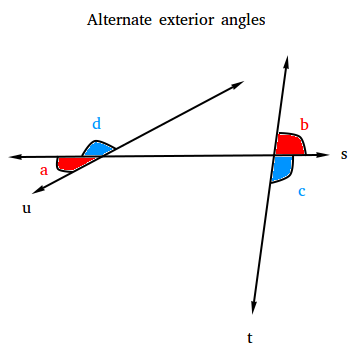Alternate exterior angles
Alternate exterior angles are formed when a line, called transversal, cuts or intersects two or more lines.
In the figure below, line s is the transversal or the line that cuts or intersects two lines ( line u and line t ).

Alternate exterior angles are on opposite sides of the transversal and on the outside of the lines the transversal cuts or intersects.
Angle a and angle b are on opposite sides of the transversal or line s and they are located outside line t and line u. Therefore, angle a and b are alternate exterior angles.
By the same token, angle c and angle d are on opposite sides of the transversal or line s and they are located outside line t and line u. Therefore, angle c and d are also alternate exterior angles.
When a transversal intersects two lines, two pairs of alternate exterior angles will always be formed.